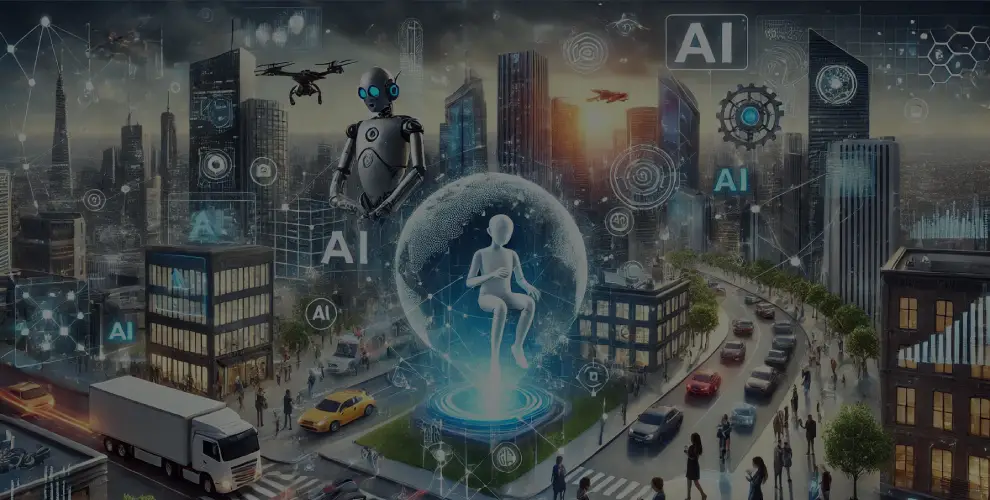
Why Is Artificial Intelligence Important in Today’s World?
Table of Contents
Introduction
Welcome to WikiGlitz!
We’ve brought you this comprehensive blog to explore the importance of artificial intelligence in the modern world, from real-world AI applications to its profound effects on industries and everyday life.
The importance of artificial intelligence in today’s world is undeniable. In 2024, AI is revolutionizing various industries, improving efficiency, and driving innovation.
From AI-powered fraud detection systems in finance to AI in retail supply chain optimization, AI technologies are making industries more agile and responsive.
PwC predicts AI will contribute over $15 trillion to the global economy by 2030.
But why is artificial intelligence important in today’s world? Let’s take a closer look at its transformative power.
Key Takeaways
- AI improves productivity and decision-making across sectors through automation and real-time data analysis.
- Use cases such as AI-powered fraud detection and AI in retail supply chain optimization are enhancing operational efficiency and customer experience.
- AI’s role in 2024 continues to grow as more industries adopt advanced technologies to remain competitive and sustainable.
How Is AI Changing the World?
AI is reshaping the world by streamlining processes, boosting productivity, and transforming industries.
For instance, in finance, AI-powered fraud detection systems are helping banks and financial institutions reduce fraud-related losses.
According to McKinsey, AI algorithms can detect fraudulent transactions with 99.9% accuracy, saving the industry billions of dollars annually.
JPMorgan Chase uses AI systems to flag unusual transactions in real time, allowing faster intervention.
In the retail sector, AI in retail supply chain optimization is making operations more efficient. Walmart, for example, uses AI algorithms to predict demand and adjust stock levels in real time, reducing out-of-stock items by 30% and optimizing logistics.
AI Applications in 2024: Real-World Use Cases
As AI continues to evolve, the applications of AI in 2024 are growing in complexity and scope. Here are some real-world examples that highlight the diversity and depth of AI’s impact:
- AI in Agriculture: AI applications in agriculture are helping farmers make data-driven decisions to increase crop yields and improve sustainability. Bayer uses AI to detect early signs of crop diseases, improving yield predictions and minimizing losses. AI-driven drones monitor soil health and help optimize irrigation schedules, leading to a 15% increase in productivity. According to McKinsey, AI could help the agriculture sector meet global food demand by 2030.
- AI in Healthcare: AI-powered diagnostic systems are transforming healthcare by enabling faster, more accurate diagnoses. Mayo Clinic uses AI to analyze complex medical data, helping doctors diagnose diseases like cancer earlier. These systems can reduce diagnostic errors by 25%. AI also enables the creation of personalized treatment plans, making healthcare more tailored and efficient. The importance of AI in healthcare lies in its ability to enhance both patient outcomes and healthcare provider efficiency.
- AI in Finance: AI-powered fraud detection is critical for financial institutions looking to protect their assets and customers. HSBC has reduced fraud-related losses by 35% using AI algorithms that monitor and flag suspicious transactions in real time. Additionally, AI-driven investment platforms like Wealthfront and Betterment offer personalized financial advice based on market trends, making AI essential in both protecting and growing wealth in 2024.
- AI in Retail Supply Chains: AI in retail supply chain optimization is allowing companies to better manage inventory and logistics. Amazon uses AI to predict delivery times and manage stock levels across its warehouses, ensuring that customers receive products faster. AI-powered solutions also help retailers reduce waste by ensuring optimal stock levels, improving sustainability, and lowering costs.
These AI applications in 2024 demonstrate how AI is becoming integral to improving efficiency, personalization, and accuracy across multiple sectors.
How Will AI Change Industries in 2024?
In 2024, AI’s ability to automate complex processes and optimize decision-making will significantly change how industries operate.
AI-driven automation is expected to enhance operations in sectors like healthcare, retail, agriculture, and finance.
- AI in Manufacturing: AI is playing a crucial role in manufacturing by improving efficiency and reducing downtime. General Electric employs AI-driven predictive maintenance systems to monitor machinery health and predict failures, reducing equipment downtime by 15%. According to Boston Consulting Group, AI can reduce manufacturing costs by 20-40% by optimizing production lines and ensuring smoother operations.
- AI in Logistics and Supply Chains: AI in retail supply chain optimization is rapidly changing how companies manage inventory and distribution. UPS uses AI to optimize delivery routes, which has reduced fuel consumption by 10% and improved delivery efficiency. AI systems can also predict potential supply chain disruptions, allowing businesses to adjust and avoid costly delays.
- AI in Education: AI applications in education are becoming more common as AI-driven platforms provide personalized learning experiences. Tools like Duolingo use AI to tailor language-learning programs to individual users, improving retention and engagement by 20%. AI can also track student progress and predict where they may need additional help, making education more responsive and personalized.
These examples of how AI will change industries in 2024 show that the technology is enabling businesses to optimize operations, cut costs, and deliver better products and services.
What Are the Advantages of Artificial Intelligence?
The advantages of artificial intelligence are wide-ranging, helping industries operate more efficiently while offering improved customer experiences:
- Increased Efficiency: AI systems automate repetitive tasks, freeing up human workers to focus on higher-level problem-solving. Accenture reports that businesses that adopt AI can see operational cost reductions of up to 40%, largely due to increased efficiency in daily tasks.
- Enhanced Data Analysis and Decision-Making: AI can process vast amounts of data quickly, uncovering patterns and providing insights that improve decision-making. AI-powered diagnostic systems in healthcare, for example, analyze patient data to help doctors make more accurate diagnoses, which can improve treatment outcomes by 15%.
- Fraud Detection and Security: AI-powered fraud detection systems help financial institutions protect against fraudulent activities by analyzing transaction data and identifying anomalies. Visa uses AI to reduce false positives in fraud detection by 30%, saving both the company and its customers money.
- Supply Chain Optimization: AI in retail supply chain optimization helps retailers better manage stock, improve logistics, and reduce costs. By predicting demand and adjusting stock levels in real time, companies can avoid overproduction and stockouts, improving sustainability and customer satisfaction.
These benefits highlight the importance of AI in business, where its ability to enhance operations, reduce risks, and improve customer experiences makes it indispensable.
How AI Improves Efficiency in 2024
One of the key reasons AI is significant in 2024 is its ability to improve efficiency across industries. From automating routine tasks to optimizing supply chains, AI is helping companies save time and reduce costs.
For example, Walmart’s use of AI in retail supply chain optimization allows the company to better manage inventory and predict demand, reducing product shortages and improving operational efficiency by 25%.
In healthcare, AI-powered diagnostic systems help doctors diagnose diseases faster, reducing wait times and improving patient outcomes.
Similarly, AI-driven automation in logistics helps companies like UPS streamline delivery routes, reducing fuel costs by 10% and cutting delivery times.
According to IDC, AI-driven solutions could boost productivity by 60% by 2025, as more industries adopt the technology to streamline their operations.
What Is the Role of AI in the Future?
Looking ahead, the role of AI in the future will continue to expand as industries embrace AI for automation, decision-making, and customer engagement.
AI will be critical in solving complex global challenges like climate change, food shortages, and healthcare accessibility.
- AI in Agriculture: AI applications in agriculture will play a crucial role in feeding the world’s growing population. AI-driven systems that monitor soil health, predict weather patterns, and optimize irrigation will help farmers increase yields and reduce resource usage. Forbes predicts that by 2030, 50% of all farming operations will use AI to optimize crop management.
- AI in Healthcare: The continued development of AI-powered diagnostic systems will improve early detection of diseases and lead to more effective treatments. In the future, AI will help create personalized treatment plans based on genetic data, revolutionizing patient care.
- AI in Business: AI’s role in retail supply chain optimization and fraud detection will continue to grow as companies look for ways to cut costs, protect assets, and offer better customer experiences. By 2025, Gartner predicts that 20% of all retail operations will be AI-driven, making AI an essential part of the business landscape.
The importance of AI in technology will only increase as industries across the globe integrate AI into their core operations to drive growth and innovation.
Why Is AI Essential in the Modern World?
AI is essential because it enables businesses, governments, and individuals to operate more efficiently and make smarter decisions.
From AI-powered fraud detection in finance to AI in retail supply chain optimization, the applications of AI are diverse and far-reaching.
The importance of AI in business and society cannot be overstated, as it helps industries operate more efficiently, improve customer experiences, and solve complex challenges.
As AI continues to evolve, its role in shaping industries and solving global problems will only grow. WikiGlitz has brought you this comprehensive look into the growing importance of artificial intelligence in the modern world.
If you’re curious to explore more on ‘Will AI Take Over the World?‘, check out our detailed blog on the topic for in-depth insights!
Follow WikiGlitz for more insights into how AI is transforming industries and society.
FAQs
How will AI change industries in 2024?
AI will change industries in 2024 by automating processes, optimizing supply chains, and improving decision-making. AI-powered fraud detection in finance and AI in retail supply chain optimization are expected to reduce costs and improve customer satisfaction.
What are the benefits of artificial intelligence?
AI offers numerous benefits, including increased efficiency, improved data analysis, and enhanced security. AI-powered diagnostic systems in healthcare improve diagnosis accuracy, while AI-powered fraud detection protects financial institutions from fraud.
How does AI impact modern industries?
AI impacts modern industries by streamlining operations, enhancing customer experiences, and improving security. AI in retail supply chain optimization allows companies like Amazon to manage stock levels efficiently, reducing waste and improving delivery times.
How is AI used in daily life?
AI is used in daily life through virtual assistants like Siri, AI-powered diagnostic systems in healthcare, and AI-driven automation in logistics that optimize delivery routes and reduce fuel consumption.
What is the future of AI in society?
The future of AI includes innovations in healthcare, agriculture, and business. AI applications in agriculture will help farmers increase crop yields, while AI-powered fraud detection will become increasingly crucial in protecting financial transactions.
Why is artificial intelligence essential in technology?
AI is essential in technology because it enables automation, enhances security, and improves customer experiences. By 2025, 20% of all retail operations will be driven by AI, according to Gartner, showing AI’s growing influence in business and society.
Want to keep up with our blog?
Our most valuable tips right inside your inbox, once per month.
Error: Contact form not found.
WikiGlitz Team
Welcome to WikiGlitz, your ultimate destination for tech insights and innovation. Our expert team is dedicated to delivering free resources and professional advice on various technology topics, including Artificial Intelligence, Cyber Security, Cloud Computing, and more. We strive to empower our readers with up-to-date information and practical guidance, ensuring you stay ahead in the rapidly evolving tech landscape. At WikiGlitz, we are passionate about making complex technology accessible to everyone. Our team of seasoned experts curates content that is both informative and engaging, helping you understand and leverage the latest tech trends. Whether you're a tech enthusiast or a professional, WikiGlitz is your go-to source for reliable, expert-driven content. Join us on this journey to explore and embrace the future of technology.





